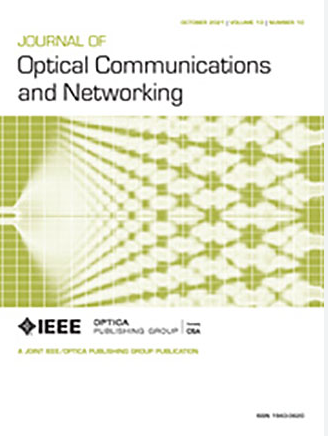利用级联学习和一次端到端测量进行多跨度光功率谱预测
IF 4.3
2区 计算机科学
Q1 COMPUTER SCIENCE, HARDWARE & ARCHITECTURE
引用次数: 0
摘要
在城域可重构光分插复用器(ROADM)网络中研究了利用机器学习(ML)进行光传输性能预测的可扩展方法。引入了级联学习框架,将级联组件模型用于端到端(E2E)光路径预测,并使用不同的 E2E 性能数据和模型组合进行增强。额外的 E2E 光路径数据和模型用于减少级联中累积的预测误差。为确保可扩展性,对元件级掺铒光纤放大器(EDFA)增益模型采用了离线训练(部署前的预训练)和迁移学习。考虑到信道功率预测,我们表明,使用迁移学习,预训练 EDFA 模型的数据收集过程可减少到原始训练集的 5%。我们在现场部署光纤的三种不同拓扑结构下评估了所提出的方法,并在部署了 12 个 EDFA 的 6 跨系统上进行了单次(一次)E2E 测量,平均绝对误差为 0.16 dB。本文章由计算机程序翻译,如有差异,请以英文原文为准。
Multi-span optical power spectrum prediction using cascaded learning with one-shot end-to-end measurement
Scalable methods for optical transmission performance prediction using machine learning (ML) are studied in metro reconfigurable optical add-drop multiplexer (ROADM) networks. A cascaded learning framework is introduced to encompass the use of cascaded component models for end-to-end (E2E) optical path prediction augmented with different combinations of E2E performance data and models. Additional E2E optical path data and models are used to reduce the prediction error accumulation in the cascade. Off-line training (pre-trained prior to deployment) and transfer learning are used for component-level erbium-doped fiber amplifier (EDFA) gain models to ensure scalability. Considering channel power prediction, we show that the data collection process of the pre-trained EDFA model can be reduced to only 5% of the original training set using transfer learning. We evaluate the proposed method under three different topologies with field deployed fibers and achieve a mean absolute error of 0.16 dB with a single (one-shot) E2E measurement on the deployed 6-span system with 12 EDFAs.
求助全文
通过发布文献求助,成功后即可免费获取论文全文。
去求助
来源期刊
CiteScore
9.40
自引率
16.00%
发文量
104
审稿时长
4 months
期刊介绍:
The scope of the Journal includes advances in the state-of-the-art of optical networking science, technology, and engineering. Both theoretical contributions (including new techniques, concepts, analyses, and economic studies) and practical contributions (including optical networking experiments, prototypes, and new applications) are encouraged. Subareas of interest include the architecture and design of optical networks, optical network survivability and security, software-defined optical networking, elastic optical networks, data and control plane advances, network management related innovation, and optical access networks. Enabling technologies and their applications are suitable topics only if the results are shown to directly impact optical networking beyond simple point-to-point networks.

 求助内容:
求助内容: 应助结果提醒方式:
应助结果提醒方式:


